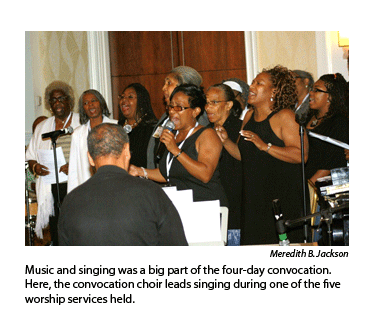By Paula Schlueter Ross
HOUSTON — Lutherans attending the Black Ministry Family Convocation, held here July 8-11, adopted resolutions and endorsed recommendations of the LCMS Black Clergy Caucus with an eye toward making sure their concerns are represented in the years ahead.
As black-ministry leaders considered action items regarding the future of black ministry in the Synod, they were aware that the first business session of the Synod’s 64th Regular Convention was scheduled to open the day 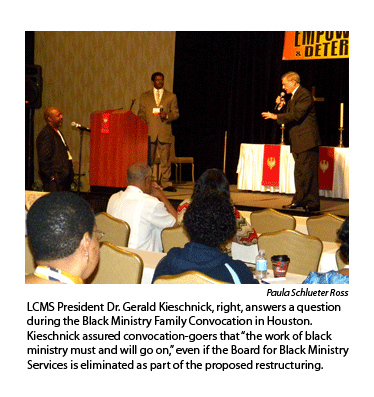 the convocation was to end. Unknown at that time was whether or not delegates to the LCMS convention would adopt the recommendations of the Blue Ribbon Task Force on Synod Structure and Governance, including a reorganization that would eliminate the Synod’s seven program boards — one of which is the Board for Black Ministry Services (BBMS) — and realign their duties elsewhere.
the convocation was to end. Unknown at that time was whether or not delegates to the LCMS convention would adopt the recommendations of the Blue Ribbon Task Force on Synod Structure and Governance, including a reorganization that would eliminate the Synod’s seven program boards — one of which is the Board for Black Ministry Services (BBMS) — and realign their duties elsewhere.
Dr. Bryant Clancy of St. Louis, a past executive director of the 33-year-old BBMS, said “it really hurt” to think that the concerns of black Lutherans would not be represented at the Synod’s national level if the program boards no longer existed. “It’s like being swept away from our church,” Clancy said in a question-and-answer session following greetings from LCMS President Dr. Gerald B. Kieschnick.
Kieschnick assured convocation participants that “the work of black ministry must and will go on,” whether or not there is a black-ministry board. “As long as I’m president of the LCMS there will be a black person coordinating black ministry at the International Center,” he said.
Rev. Matthew Harrison, executive director of LCMS World Relief and Human Care and, with Kieschnick, a nominee for LCMS president, also addressed the convocation, saying, “I think it’s a terrible mistake to do away with the program board.”
Harrison quoted the late LCMS black-ministry leader Dr. Richard Dickinson, who had once said that, without African-American representation, LCMS black ministry was like “a black body with a white head.”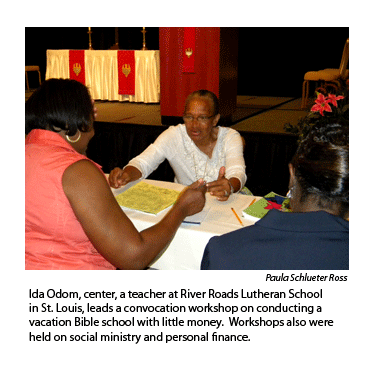
“The Board for Black Ministry makes sure that the black body has a black head,” he said.
More than 240 people attended the convocation under the theme “Ablaze, Empowered and Determined,” from Phil. 3:13b-14.
Although he was “a little disappointed” that more people didn’t attend the convocation, Eugene Wright of Baltimore said “it’s very refreshing to hear [the speakers] and I think encouraging to hear what they have to say.”
Wright said he believes black ministry needs to have a continuing voice in the church body. “For a good team to work, you need everybody to be involved, and input from all,” he said.
Ella Jefferson of Chicago said the convocation has impressed on her that “we have to really go out and be more persistent to bring people to faith.”
Fannie S. Kelley of Chicago was attending her third convocation. She had brought her three grandchildren, who live with her, to the event as a family vacation.
“I bring them because I thank God my grandchildren love church, and I want to keep this interest going,” Kelley said. “This is the best family vacation we could possibly have.”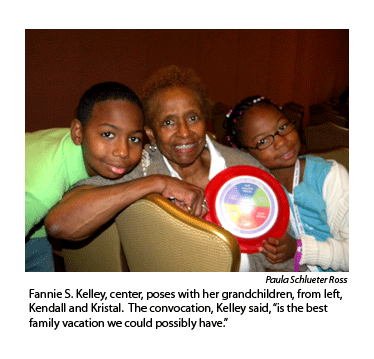
Kelley’s grandchildren — who were attending youth-track activities — said they also enjoyed the convocation.
“I like the location of it and I like the family events they have together,” said Kendall, 12.
Kristal, 9, said she likes the gathering “because you get to learn more things [about God] and have fun.”
Kirby, 17, said “it’s a unique way to meet people of the same faith as you.”
Some 50 voting delegates adopted nine resolutions, including several that relate to the BBMS. After some discussion, delegates voted to remove the phrase “should it continue to exist after the 2010 convention of the Synod” that appeared after “BBMS” in the original wording of those resolutions. Those who spoke for the change said it reflected a more positive approach, since the board still exists.
Adopted resolutions ask:
- the BBMS to call an executive director within six months. Dr. Frazier Odom, who has been serving since November 2008 as interim executive director, has announced his intention to retire.
- Lutherans in black ministry to support Concordia College, Selma, Ala., the Synod’s only historically black college, by seeking “faculty positions and educational pursuits” there and contributing financially. Suggested annual donations are $250 for pastors, and $250 or $500 for congregations, depending on their size.
- the Black Ministry Family Convocation to work with the BBMS to “implement a new, active policy direction in support of congregations in black ministry” and a “restructuring of the board’s staff positions to better reflect the needs of congregations.”
- the convocation and the BBMS to work toward the establishment of an LCMS staff position for the purpose of raising funds for black ministry.
- the convocation and the BBMS to develop a recruitment program for black ministry workers, and encourage Concordia College, Selma, to establish curriculum to prepare professional church workers.
- the convocation to advocate for a “strong black/African-American voice” within the proposed LCMS Board for National Mission.

- the BBMS to “redefine the purpose, selection method and implementation strategies” of black-ministry units in LCMS districts, and help establish such units in all LCMS districts.
- the BBMS to encourage LCMS districts to appoint “black ministry district advisory” representatives to coordinate local black-ministry efforts.
- the convocation to acknowledge and thank God for those who contributed to and helped organize the 2010 convocation.
In his report from the Black Clergy Caucus (BCC), President Rev. James Wiggins Jr. shared several recommendations from a task force of the BCC and BBMS that were subsequently endorsed unanimously by convocation participants.
Those recommendations ask:
- the convocation to prepare a list of candidates that could be used to fill a black-ministry executive position on the national level of the LCMS, and to send that list of names to the LCMS president.
- black-ministry delegates to the national LCMS convention to nominate African-Americans who would be willing to serve, if elected, on the national or international mission commissions if the Synod is restructured, as proposed.
- convocation delegates to support the goals of the BCC-BBMS Task Force, the BCC and the BBMS for developing strategic plans for black ministry if the Synod is reorganized.
- the BBMS to “move expeditiously” to call a new executive director if the current LCMS structure does not change.
- the convocation, BCC and district unit leaders to work together to create an association of congregations in black ministry “to continue the work of black ministry.”
In his keynote, Dr. John Nunes, president and CEO of Lutheran World Relief (LWR), Baltimore, related how he suffered with a sore toe for 10 days, not realizing it was broken until he finally saw a do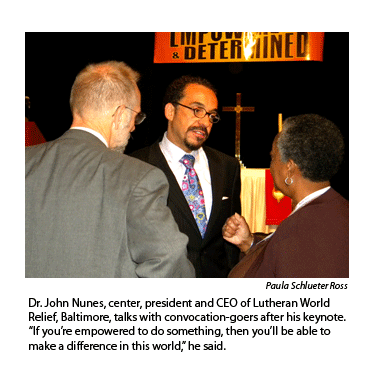 ctor. He used that as a metaphor for the “longer suffering of those who are limping their way through life with brokenness,” and said there are many people who “look normal on the outside but are hurting on the inside,” particularly “church people,” he added, who “are the best … in the world” at “hiding [their] hurts.”
ctor. He used that as a metaphor for the “longer suffering of those who are limping their way through life with brokenness,” and said there are many people who “look normal on the outside but are hurting on the inside,” particularly “church people,” he added, who “are the best … in the world” at “hiding [their] hurts.”
“With the power of God behind us, the presence of God beside us and the promise of God before us,” Christians are “perfectly placed” to reach out to the world’s hurting people, including other Christians, he said.
Nunes also encouraged the convocation to “keep dancing in spite of racism” that’s still prevalent in America. And he introduced the “Lutheran Malaria Initiative” — a collaborative effort by LWR, the LCMS, the Evangelical Lutheran Church in America and the United Nations Foundation to eradicate the disease that claims a million lives a year.
“If you’re ablaze with something, then you’ll be empowered to do something,” he said, modeling his words on the poem “Something Else” and incorporating the convocation’s theme. “If you’re empowered to do something, then you’ll be able to make a difference in this world.”
In his remarks to the convocation, Kieschnick called ministry to ethnic groups and young people “two huge challenges” that the Synod needs to address. “We have the answers” to those who are questioning life, he said, and those answers are “revealed in the Holy Scriptures.”
He said he is “excited” about the future of Concordia, Selma, where “opportunities abound,” including a proposed land purchase to expand the campus. He encouraged convocation participants to help recruit church workers by speaking “to those who have gifts to be professional church workers,” since many young people “look to you as heroes.”
In his report, BBMS Executive Director Dr. Frazier Odom recalled the birth of the BBMS in 1977 and the current Blue Ribbon Task Force proposals that may eliminate the BBMS and other program boards.
“How are we going to keep black ministry alive?,” Odom asked the convocation. “It’s possible, but it depends on you,” he said. “We must make a rule that we will be involved.”
Odom urged convocation participants to contribute to the Dr. Richard C. Dickinson Memorial Fund, which will be used to rec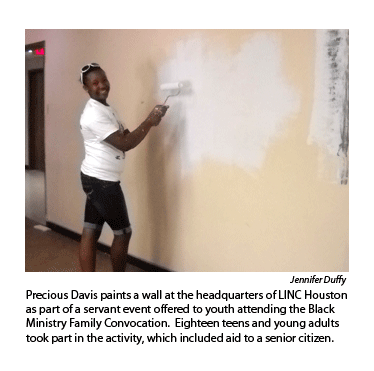 ruit, train and deploy future church workers, and is a way “to keep black ministry going,” he said.
ruit, train and deploy future church workers, and is a way “to keep black ministry going,” he said.
Dickinson, the first executive director of the Synod’s Commission on Black Ministry, which preceded the BBMS, died April 17 at the age of 85. He was the recipient of the first “Lifetime Achievement Award” given by the BCC, and had served in LCMS black ministry for more than 50 years.
In a presentation titled “Where are we going from here?,” Rev. James McDaniels, BCC vice president, shared a recruitment report prepared by Dickinson for the convocation. In that report, Dickinson said the LCMS needs to graduate over the next decade 35 pastors a year to meet the needs of the Synod’s 400 black congregations. There are currently about 75 black pastors serving those congregations, McDaniels reported, and only one black seminary student.
“All of us have to take responsibility” for recruiting church workers, McDaniels said, echoing the words of Dickinson. McDaniels said he came from a congregation that produced more than two dozen church workers. “I know congregations that haven’t produced one and they are 100 years old,” he said.
The four-day convocation included five worship services. In the opening service, Rev. Ulmer Marshall addressed the “Ablaze, Empowered and Determined” theme and its roots in the words of St.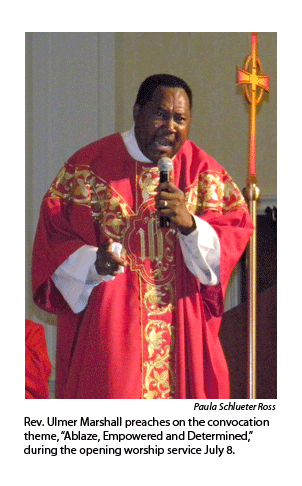 Paul: “Not that I have already obtained all this, or have already been made perfect, but I press on to take hold of that for which Christ Jesus took hold of me. Brothers, I do not consider myself yet to have taken hold of it. But one thing I do: Forgetting what is behind and straining toward what is ahead, I press on toward the goal to win the prize for which God has called me heavenward in Christ Jesus.”
Paul: “Not that I have already obtained all this, or have already been made perfect, but I press on to take hold of that for which Christ Jesus took hold of me. Brothers, I do not consider myself yet to have taken hold of it. But one thing I do: Forgetting what is behind and straining toward what is ahead, I press on toward the goal to win the prize for which God has called me heavenward in Christ Jesus.”
Like the words of St. Paul relate, “we have not arrived yet,” we have not reached the “perfection” that awaits us in heaven, Marshall said. The church is not a place for perfect people, so we need to go out and invite other sinners to worship, and “maybe our churches would start growing,” he said.
To “press on with zeal,” Marshall said, “we need to stand on God’s Word.” The church needs to pray, he said, “like we have never prayed before.”
“Because the Holy Spirit has empowered us … we need to be determined to not look back and run for the goal,” he said.
In his sermon on Friday night, Rev. Aaron Dickerson encouraged worshipers to “look back and start thanking God for what He has done for you,” to look ahead, trusting that God will care for you, and to “look around” to see opportunities to serve Him.
Dickerson said he was not worried about the B-R-T-F-S-S-G [Blue Ribbon Task Force on Synod Structure and Governance] report or the new Synod structure because he has “G-O-D … His “S-O-N” … and the “H-O-L-Y S-P-I-R-I-T,” he said, spelling the words.
Concordia, Selma, President Dr. Tilahun Mendedo shared his priorities for the college, including re-establishing accreditation, improving campus safety and finances, establishing partnerships with other Concordia University System schools, setting up off-campus sites and acquiring faculty and staff. He said he hopes to close on the new-property purchase this summer, and has renovations planned for all campus buildings, which are outdated.
A “Recognition Banquet” honored 17 pastors and teachers — each with more than 50 years of service. Among them was Rev. Gulfrey Laurent of Carson,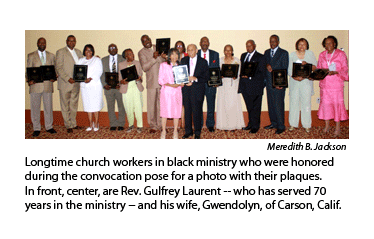 Calif., with 70 years of service, and Dr. Robert King, of Jefferson City, Mo., and Dr. William H. Griffin, of Detroit — with 60 years each.
Calif., with 70 years of service, and Dr. Robert King, of Jefferson City, Mo., and Dr. William H. Griffin, of Detroit — with 60 years each.
Since the biennial convocations are sponsored by the BBMS — and that board’s future is uncertain — participants said they are hoping the gatherings can continue.
“As our theme mentioned, we are determined to press on,” Rev. Ulmer Marshall told Reporter. “We’re determined to, no matter what, whether the reconstruction of Synod comes about [or not].”
Marshall said he believes “there’s a need for our members to come together. So there will be some form or fashion of a convocation — whether it will be regional or n

